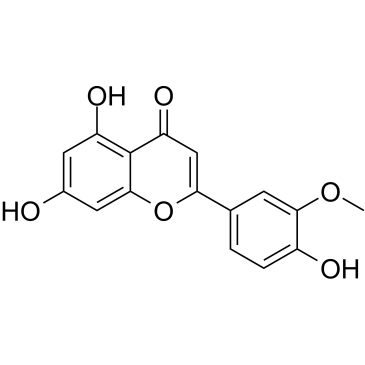
Chrysoeriol
CAS No. 491-71-4
Chrysoeriol( —— )
Catalog No. M21732 CAS No. 491-71-4
Chrysoeriol, a natural flavonoid extracted from the tropical plant Coronopus didymus, exhibits potent antioxidant activity.
Purity : >98% (HPLC)
 COA
COA
 Datasheet
Datasheet
 HNMR
HNMR
 HPLC
HPLC
 MSDS
MSDS
 Handing Instructions
Handing Instructions
| Size | Price / USD | Stock | Quantity |
| 5MG | 189 | In Stock |


|
| 10MG | 267 | In Stock |


|
| 25MG | 471 | In Stock |


|
| 50MG | 681 | In Stock |


|
| 100MG | 954 | In Stock |


|
| 200MG | Get Quote | In Stock |


|
| 500MG | Get Quote | In Stock |


|
| 1G | Get Quote | In Stock |


|
Biological Information
-
Product NameChrysoeriol
-
NoteResearch use only, not for human use.
-
Brief DescriptionChrysoeriol, a natural flavonoid extracted from the tropical plant Coronopus didymus, exhibits potent antioxidant activity.
-
DescriptionChrysoeriol, a natural flavonoid extracted from the tropical plant Coronopus didymus, exhibits potent antioxidant activity. Chrysoeriol shows significant inhibition of lipid peroxidation.
-
In VitroChrysoeriol (5 μM, 10 μM or 20 μM; 24 h) exert a neuroprotective effect in the MPP--triggered cytotoxicity and apoptosis in SH-SY5Y cells。Chrysoeriol (20 μM; 24 h) inhibits the production of NO and PGE2 in LPS-stimulated RAW 264.7 cells.
-
In Vivo——
-
Synonyms——
-
PathwayNatural Products
-
TargetFlavonoids
-
Recptor——
-
Research Area——
-
Indication——
Chemical Information
-
CAS Number491-71-4
-
Formula Weight300.26
-
Molecular FormulaC??H??O?
-
Purity>98% (HPLC)
-
SolubilityIn Vitro:?DMSO : 100 mg/mL (333.04 mM)
-
SMILESO=C1C=C(C2=CC=C(O)C(OC)=C2)OC3=CC(O)=CC(O)=C13
-
Chemical Name——
Shipping & Storage Information
-
Storage(-20℃)
-
ShippingWith Ice Pack
-
Stability≥ 2 years
Reference
1. Beena Mishra, et al. Effect of O-glycosilation on the Antioxidant Activity and Free Radical Reactions of a Plant Flavonoid, Chrysoeriol. Bioorg Med Chem. 2003 Jul 3;11(13):2677-85.
molnova catalog



related products
-
Chrysoeriol
Chrysoeriol, a natural flavonoid extracted from the tropical plant Coronopus didymus, exhibits potent antioxidant activity.
-
Luteolinidin chlorid...
Luteolinidin is a natural deoxyanthocyanidin, isolated from mosses and ferns.
-
Isobavachalcone
Isobavachalcone (Corylifolinin, Isobacachalcone) is a chalcone constituent of Angelica keiskei that can induce apoptosis in several cancer cells, also shows activity against multidrug-resistant (MDR) Gram-negative bacterial isolates.



 Cart
Cart
 sales@molnova.com
sales@molnova.com


